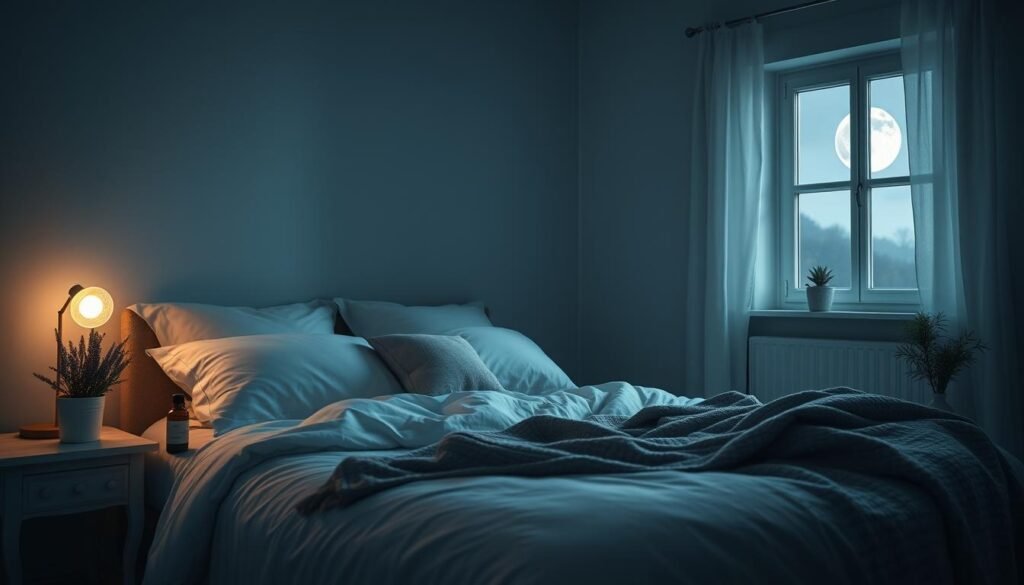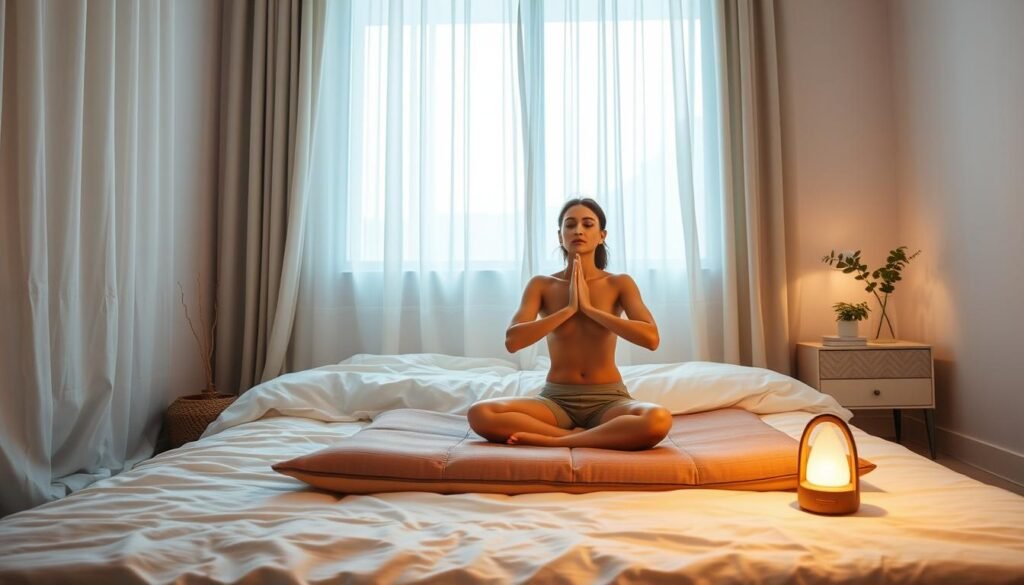About 30% of adults face short-term insomnia because of travel or stress. More than 60 million Americans deal with poor sleep, risking depression and chronic diseases. Dr. Charlene Gamaldo suggests using natural remedies and adjusting our lifestyle instead of taking sleep medicines. Options like warm milk, chamomile tea, and tart cherry juice help sleep well without the risks of drugs. This article explores ways to treat hormonal insomnia with effective treatments and positive lifestyle changes.
Key Takeaways
- Hormonal imbalances can significantly contribute to sleep disorders, especially in women during menopause.
- Natural remedies and lifestyle changes can improve sleep quality effectively without over-reliance on medication.
- Practicing good sleep hygiene is crucial for achieving restful nights.
- Exercise and mindfulness techniques can enhance overall sleep quality.
- Dietary choices, including the consumption of phytoestrogens, play a role in regulating sleep hormones.
The Importance of Quality Sleep
Quality sleep is key for keeping healthy and feeling well. When people don’t get enough good sleep, they may have trouble with memory, focusing, and staying in a good mood. For women, health impacts of sleep deficiency are especially significant. Some studies show that 30% of pregnant women hardly ever get restful sleep. And after having a baby, the problem can get even bigger, with 42% of new moms facing these issues.
During menopause, many women find it hard to sleep well too. Reports say 40–60% of women going through menopause struggle with sleep. This drop in sleep quality can lead to serious health issues like obesity, diabetes, and heart problems. Women are also more likely than men to suffer from insomnia and restless leg syndrome. This highlights the importance of finding effective hormonal insomnia treatment.
Building good sleep habits can greatly improve sleep quality. This can boost brain power and help balance hormones. It’s very important to understand the value of sleeping well. Things like sticking to a regular bed time and having a relaxing routine before bed can make a big difference in health and well-being.
| Group | Reported Sleep Issues |
|---|---|
| Pregnant Women | 30% rarely get good sleep |
| Postpartum Women | 42% rarely get good sleep |
| Perimenopausal Women | 25% sleep well only a few nights/month |
| Postmenopausal Women | 30% sleep well only a few nights/month |
| Overall Insomnia Prevalence in Women | Higher than in men |
| Menopausal Women with Sleep Problems | 40–60% report significant sleep disturbances |
Understanding Hormonal Insomnia
Hormonal insomnia is a big challenge for many, especially during major life changes. Hormonal swings can mess with normal sleep, causing ongoing issues. This problem is often severe for women going through menopause, as changes in hormones can upset sleep.
About 35% of adults suffer from insomnia symptoms at some point. Among them, 39% to 60% of menopausal women face sleep problems due to hormonal shifts. Estrogen and progesterone levels play a big part in sleep quality. For women in their forties and fifties, these hormonal changes may lead to night sweats, sleep apnea, and restless legs.

It’s crucial to understand how hormones and sleep affect each other for treating hormonal insomnia. As we age, our melatonin levels go down, making sleep tougher for older adults. High progesterone can help by boosting GABA levels, which relaxes us and improves sleep. But, low testosterone in men can shorten sleep, showing how vital it is to balance hormones.
Noticing symptoms linked to hormonal ups and downs, like waking up often, can help tailor treatments. By focusing on these root issues, we can better our sleep and health. To dive deeper into hormones and sleep, check out this article for more insights.
Common Causes of Hormonal Imbalance and Insomnia
Understanding causes of hormonal insomnia sheds light on why good sleep escapes many. Hormonal imbalances come from various sources, like aging, stress, and thyroid issues. For women, changes in estrogen and progesterone can make sleeping hard.
Every year, insomnia hits roughly 1 in 3 adults in the United States. Women are 58% more likely to have trouble sleeping than men. Over 75% of expectant mothers face insomnia, mainly in the late stages of pregnancy. Hormonal changes that affect sleep worsen with bad diets, lack of exercise, and stress. About 60% of new moms experience insomnia eight weeks postpartum.
Treating causes of hormonal insomnia is key. Cognitive Behavioral Therapy for Insomnia (CBT-I) is highly recommended. Exploring bioidentical hormone therapy can also help with sleep issues due to hormonal changes. Visit this resource for more info. Balanced hormones greatly improve sleep quality, essential for health.
Hormonal Insomnia Treatment: Exploring Options
Dealing with sleep issues due to hormonal changes is crucial. To naturally treat hormonal insomnia, one often mixes lifestyle changes with herbal solutions. These can greatly boost sleep quality. Making healthy choices and exploring natural treatments helps in controlling insomnia.
Natural Remedies for Hormonal Insomnia
Various hormonal insomnia remedies help in achieving deep sleep without the negatives of drugs. Options include:
- Herbal teas, like chamomile and valerian root.
- Melatonin supplements to aid the sleep cycle.
- Regular physical activity improves sleep.
- Meditation and yoga reduce stress and relax.
- Magnesium supplements might ease insomnia symptoms.
These methods work by balancing hormones and boosting sleep hygiene. They don’t just battle insomnia but enhance general health too.
Behavioral Therapy Approaches
Taking a structured path through behavioral therapy for insomnia is effective for better sleep habits. Cognitive Behavioral Therapy for Insomnia (CBT-I) changes sleep-disrupting thoughts and actions. CBT-I focuses on:
| Technique | Description |
|---|---|
| Sleep Restriction | Reduces bed time to boost sleep quality. |
| Relaxation Techniques | Includes deep breathing, progressive muscle relaxation. |
| Sleep Hygiene Education | Teaches how to make a bedtime routine better. |
Studies show CBT-I has lasting benefits, fostering healthy sleep habits. Often, it takes 6 to 8 sessions to see results, making it a better choice than pills.
Exploring more about sleep through resources like sleep health education gives additional support for better rest.
Role of Estrogen and Progesterone in Sleep Quality
Estrogen and progesterone are key in regulating sleep quality. They work on brain receptors affecting the sleep-wake cycle. Estrogen helps maintain receptors that promote sleep. Progesterone brings a calming effect, aiding in falling and staying asleep.
During menopause, these hormone levels drop, causing sleep issues like insomnia and hot flashes. Studies show 40% to 60% of women face sleep problems during perimenopause and postmenopause. Compared to before menopause, self-reported sleep issues increase significantly. Low progesterone levels are linked to insomnia and sleep apnea, worsening sleep disturbances.
Hormone therapy offers hope for insomnia treatment. Research indicates it improves sleep quality, with hormone therapy making a notable difference. 17β-estradiol, for instance, greatly enhances sleep. Transdermal hormone therapy is more beneficial than oral methods, studies reveal.
Using both estrogen and progesterone, like in estrogen/micronized progesterone treatments, shows promise in addressing sleep disturbances. With their significant impact on sleep, women with menopause-related sleep issues should consider hormone therapy. Consulting healthcare providers can offer personalized treatment options.
For additional information on menopause and sleep, check out this resource.
How Lifestyle Changes Can Prevent Hormonal Sleep Disorders
Changing your lifestyle can make a big difference in your sleep and happiness. Adding exercise and mindfulness to your day can help manage sleep issues caused by hormones. This means better sleep and less tossing and turning at night.
Exercise and Its Impact on Sleep
Exercise is key for good sleep. It helps you fall into a deep sleep that repairs your body. But be careful with timing; working out too late can keep you awake. A regular workout schedule is important for fighting off insomnia and sleeping better.
Mindfulness and Relaxation Techniques
Mindfulness makes it easier to relax and sleep well. It lowers stress and leads to better sleep cycles. Doing yoga and deep breathing relaxes your mind and body, setting you up for a good night’s sleep. These habits not only calm your mind but also improve how well you sleep.

| Activity Type | Benefits for Sleep | Recommended Frequency |
|---|---|---|
| Exercise | Increases slow-wave sleep, decreases insomnia symptoms | At least 150 minutes per week |
| Mindfulness Meditation | Reduces stress, promotes relaxation | Daily practice recommended |
| Yoga | Enhances relaxation, prepares mind for sleep | 3-4 times a week |
Melatonin: The Sleep Hormone
Melatonin is key for controlling sleep. It’s made in the brain and rises at night, telling our bodies it’s time to rest. Sadly, artificial lights and screens can lower its production. This can cause sleeping issues. Melatonin supplements, taken in 1 to 5 mg doses at bedtime, can help. They have become popular for their benefits on sleep quality and timing.
Studies show melatonin helps those with circadian rhythm sleep disorders. It aids both adults and kids who struggle to fall asleep. For instance, people with delayed sleep phase disorder can fall asleep up to two hours earlier with it. Its role in enhancing sleep quality and duration is still being studied, particularly for insomnia.
Melatonin may also ease jet lag symptoms like tiredness during the day. It might help shift workers deal with their unusual sleep schedules. Even though melatonin can be beneficial, it can cause side effects. These include headaches, dizziness, and nausea. Fewer people might experience anxiety or irritability.
Be cautious with melatonin, especially if taking certain medications. It can interact with these drugs and worsen some medical conditions. It’s advisable not to drive or do dangerous activities for five hours after taking it.
Research also sees potential in melatonin for kids’ sleep issues. It could enhance sleep for young patients. The ongoing study into melatonin and sleep is promising. It holds potential benefits for many struggling with sleep problems.
Dietary Choices to Support Hormonal Balance
A nutritious diet is key to maintaining hormonal balance and better sleep. What you eat and when matters a lot for your hormones. With the right food choices, you can improve your sleep quality.
Foods That Support Sleep
To sleep better, include foods for better sleep in your diet. Foods with certain nutrients can balance your hormones and help you relax. Here are some you might add:
- Phytoestrogen-rich foods: Soy products and flaxseeds can help in stabilizing estrogen levels.
- Magnesium-rich foods: Nuts, whole grains, and leafy greens contribute to magnesium and sleep, essential for muscle relaxation.
- Complex carbohydrates: Whole-wheat toast and oatmeal can enhance serotonin levels, which are crucial for a sleep-promoting diet.
- High-protein options: Foods like steak and chicken should be consumed mindfully since they can slow digestion during sleep.
Try to avoid spicy foods, processed cheese, and alcohol before bed to maintain sleep quality. While alcohol can make you fall asleep quicker, it often harms sleep cycles later.
The Role of Supplements
Supplements can also play a part in improving sleep. Supplements for insomnia, like magnesium, help with relaxation and sleep quality. Natural remedies like Valerian root and lavender are also helpful. These alternatives, highlighted in recent studies, improve sleep and hormone health.
| Supplement | Benefits | Recommended Usage |
|---|---|---|
| Magnesium | Supports muscle relaxation and improves sleep quality | 250-500 mg before bedtime |
| Valerian Root | May reduce time taken to fall asleep | 300-600 mg 30 minutes before bed |
| Lavender | Known for its calming effects, potentially enhancing sleep quality | Can be used as essential oil or in tea |
By choosing the right diet and supplements for hormonal balance, you can better manage insomnia. This approach leads to improved sleep and a better life.

Conclusion
Understanding what causes hormonal insomnia is key to sleeping well. To beat this, you may need different approaches: natural cures, changing your lifestyle, and maybe professional help. Studies show insomnia hits many people, but women more so because of changes in hormones during puberty, pregnancy, and menopause.
Those having trouble sleeping can look into treatments like herbal supplements, better sleep habits, and Cognitive Behavioral Therapy for Insomnia (CBT-I). These can help you take charge of your sleep issues. They lead to better health and well-being.
It’s important to understand how our surroundings and mental state affect our sleep. Women might face extra sleep challenges due to hormone shifts and stress. Exploring different methods can not only improve sleep but also enhance life quality.